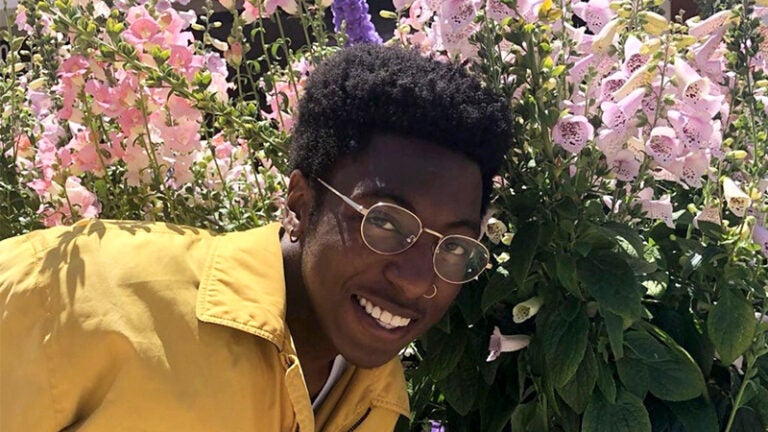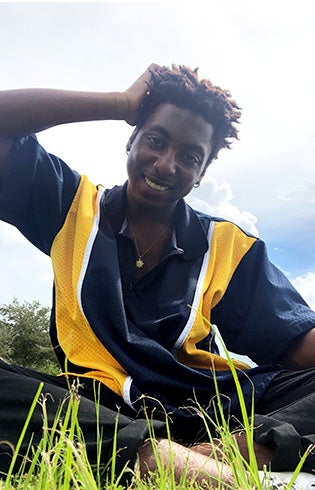
History major aims to build on the work of social activists who came before
When Felanté Charlemagne applied to the Mellon Mays Undergraduate Fellowship (MMUF) program, his research focused on decarceration — the study of government policies and community campaigns to decrease the number of people imprisoned in the United States. His research focus has since evolved to include the Black radical tradition.
A junior majoring in history at the USC Dornsife College of Letters, Arts and Sciences and a first-generation college student, Charlemagne says he was inspired by the current historical and political moment that has been thrown into greater relief by a global pandemic and the resurgence of the Black Lives Matter movement.
“After the pandemic started, I began seeing the limitations of privatized health care and the handling of our pandemic response, and that the people who are suffering the most are Black and Indigenous Americans.”
From his research, Charlemagne concludes that what is needed to rebuild and to recover after the pandemic is, first, not simply the moral reparations — a reckoning with our politics, attitudes and culture — that typically follow a crisis, but material reparations and, second, to use our political imaginations to create a non-capitalist solution.
“Staying away from privatization in an economy centered around a profit incentive could have done so much to change the course of this pandemic,” he says.
Charlemagne says Angela Davis, a foremost abolitionist thinker and activist, and her book Freedom Is a Constant Struggle was his introduction to radical politics.
Shortly before the start of the pandemic, Charlemagne joined Critical Resistance, a national grassroots organization founded by Davis and fellow prison abolitionist Ruthie Wilson Gilmore, that is working to build alternatives to imprisonment.
“We made cards around the holiday time and sent them to individuals in prison to let them know that they’re valued and there are people thinking about them,” Charlemagne says.
Before the pandemic, he also started a club at USC called Students for Justice and Liberation with the intention of doing anti-gentrification work in partnership with other Los Angeles-based organizations.
“I feel like it’s very easy to have a savior complex. It’s important to center the people who are actually victims of these tragedies or injustices in the political work rather than trying to take the mantle yourself.”
Caribbean beginnings
Born to a cosmetologist and a building contractor in St. Thomas in the U.S. Virgin Islands, Charlemagne moved to Florida with his family when he was two years old and grew up in the small town of Ocala, 38 miles south of Gainesville.
Charlemagne’s unique last name comes from his father’s family in the Caribbean island of St. Lucia and is, of course, the name of the famous king of the Franks during the Early Middle Ages. His original first name is a twist on his father’s.

“My father’s name is Felix, so my parents took those first three letters and freestyled the rest.”
Until Hurricane Irma hit the Caribbean in 2017, Charlemagne returned to St. Thomas almost every summer.
Growing up, he split his time between playing video games and reading voraciously.
“I have my mom to thank for that,” he says of the latter. “She would take us to the public library.” He still adores reading — but his tastes have progressed from the Percy Jackson series and The Hunger Games — particular favorites during childhood — to nonfiction and political theory.
When it came time to apply to university, Charlemagne was offered places at USC and at Columbia University. After visiting both, he says it was clear that USC was where he belonged.
“I’ll admit part of it is that I’ve always been in warm weather, so the cold doesn’t really agree with me, but also the energy I got from the students made me think I would fit in more at USC. The students there seemed warmer, friendlier and just happier.”
A career in academia?
A Gateway Scholar, Charlemagne started out as a computer science major but switched to sociology after his first semester. He says he fell in love with the field and the way it opened his eyes to the potential of research. He decided to major in history to take advantage of some of the department’s course offerings but has retained a sociology minor, saying, “I think my heart is still in sociology.”
His interest in research prompted him to apply for a Mellon Mays Undergraduate Fellowship (MMUF). The program is the centerpiece of the Andrew W. Mellon Foundation’s initiative to increase the commitment to diversity in the faculty ranks of colleges and universities both in the U.S. and abroad in order to bring a wider range of experiences and perspectives to teaching and scholarship.
USC’s MMUF program is a partnership between USC Dornsife and the Office of the Provost that identifies, supports and mentors highly qualified underrepresented undergraduate students and other students interested in diversifying faculties in higher education. It encourages them to pursue a Ph.D. in fields where diversity has not been historically present.
The fellowship provides a $1,800 stipend every semester and a $3,800 summer stipend to cover research costs and expenses.
Unfortunately, due to COVID-19 restrictions, Charlemagne and his fellow students in this year’s Mellon Mays cohort have been unable to take advantage of the many extracurricular opportunities, such as summer conferences, workshops and study abroad programs, usually on offer.
However, he welcomed a training course on research methods in his first semester in the program and enjoyed attending a virtual conference, which he found rewarding.
“I was concerned that some of the quality would be lost due to the fact that it was in a virtual setting, but I actually really did enjoy it,” he says. He also hopes to be able to take up some of the program’s foreign travel opportunities following the pandemic.
Charlemagne says he isn’t absolutely sure what he wants to do when he graduates, but since being selected as a Mellon May Fellow, pursuing a career in academia is something he is seriously considering.